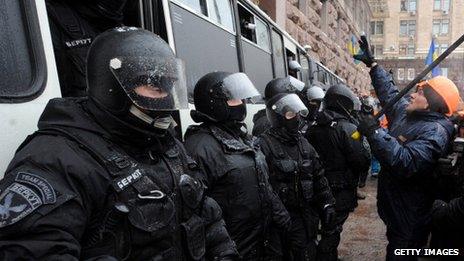Ukraine's Berkut police: What makes them special?
- Published

The name "Berkut", or "Golden Eagle" in Ukrainian, became synonymous with police brutality for many protesters in the capital, Kiev. The now-disbanded Berkut was an elite riot police force at the forefront of recent deadly clashes there.
Its members have been accused of beating, torturing and shooting demonstrators. Unprovoked attacks on journalists and medical workers have also been alleged. A video clip also emerged earlier, showing a naked protester apparently being abused and beaten by riot policemen who had stripped him in sub-zero temperatures.
While food and hot drinks were offered by sympathetic demonstrators to police officers and army servicemen amid the stand-off in late 2013, Berkut members bore the brunt of anti-government ire after tensions flared up in January.
What is Berkut?
Berkut members were reported to have been more carefully selected, better trained, paid and equipped than ordinary police units. They were also said to have had more senior officials as commanders.
The force was set up in 1992 and had its roots in Omon, the notoriously ruthless Soviet "special-purpose police". Initially, Berkut's primary goal was to fight organised crime, but later changed to ensuring law and order during "mass events".
Ukraine's police is run by the Interior Ministry, which itself was until recently headed by Vitaly Zakharchenko, a steadfast supporter of toppled President Viktor Yanukovych. Mr Zakharchenko hails from the ousted president's home region of Donetsk and is also reported to be close to his son, Oleksandr.
Mr Zakharchenko is now wanted by the new authorities in Kiev for the killing of demonstrators.
The media in Ukraine say Berkut members were rigorously trained. To be accepted into Berkut, army service and at least two to three years of law-enforcement experience were said to be compulsory.
Chances of employment with Berkut increased if the applicant was an athlete with a proven track record, reports say.
Berkut had about 4,000 to 5,000 members stationed across Ukraine. Local units were directly subordinated to the heads of regional Interior Ministry departments, instead of lower-ranking police officials such as district police chiefs.
It was not unusual for Berkut units to be dispatched from their bases to other regions. Report say that many of them were brought to Kiev from eastern Ukraine, which was more supportive of Mr Yanukovych.
Berkut members from more opposition-minded western Ukraine, meanwhile, complained to the media that they were "mistrusted" by top commanders.
Berkut had some serious hardware at its disposal, including machine guns and armoured personnel carriers. Its members were also reportedly paid 1.5-2 times more than the average police officer.
BBC Monitoring, external reports and analyses news from TV, radio, web and print media around the world. For more reports from BBC Monitoring, click here. You can follow BBC Monitoring on Twitter , externaland Facebook, external.